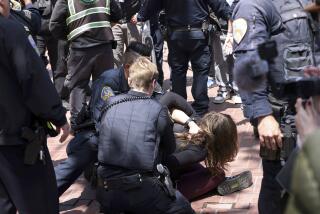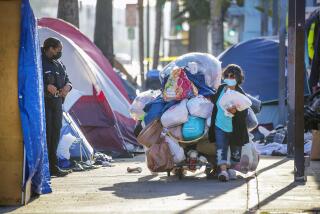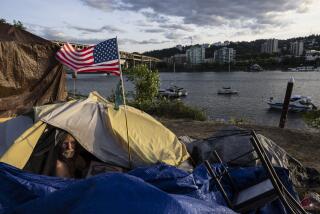Occupy Portland dispersal a tough call for mayor
Portland Mayor Sam Adams, the first openly gay man to lead a major American city, is no stranger to street protest — he’s been in the middle of more than he can count. He’s battled for bike lanes, railed against social services funding cuts and led the charge for green buildings.
Now, he’s the progressive mayor of one of the nation’s most progressive cities — and his police force recently stormed in riot gear through a camp full of true believers.
“It turned into a brawl over Porta Pottis and crime,” Adams said glumly last week at City Hall, not far from where the abandoned parks of Occupy Portland stood empty and forlorn, surrounded by makeshift chain-link fences.
From New York to Oakland, Occupy camps have worn out their welcome, with crime, squalor and traffic blockades increasingly capturing more attention than proclamations about corporate dominion and inequitable wealth.
But the decision to close them has been heart-wrenching for mayors in many cities — particularly in Portland, Seattle and Vancouver, Canada, where bicycle-riding, carbon-hating politicians probably feel as much sympathy for the people in the camps as for the downtown business executives upset about threats to the holiday shopping season.
“I support a lot of what the movement stands for, as a political leader. But as a mayor, I have responsibilities that are different from that,” Adams said.
Adams, who was elected in 2008, was almost exuberant when the first of the Occupy Portland protesters planted themselves downtown at Lownsdale Square and adjacent Chapman Park.
“My first email to the staff was, ‘All right, let’s plan on how we can make this peaceful,’” Adams said. “I wanted the city to respond from a principled approach. We were going to balance free speech while managing the impacts of that and keeping the city safe and moving. We were going to be patient, we were going to staff ourselves, and we were going to engage.”
But as time wore on, so did the city’s patience. Five weeks in, half of Adams’ progressive supporters were in the camp; the other half were pleading with him to make it go away.
The warren of tents, tarps and cookstoves, as with many camps across the country, had become a haven for teen runaways and the mentally ill homeless. Assaults were rising; there were drug overdoses, staph infections and reports of rats; the camp had to open “safe injection” and “sexual assault response” tents.
Commentators at the leftist Portland Mercury were calling the campers “whiners” who were “like student government types from high school … protesting the fascist police state on campus.”
One reader wrote: “Before Occupy, I would have bet several needed internal organs that I would never side with the Portland police in any situation involving protesters. But here I stand, siding with the police and the mayor. Thanks Occupy.”
Adams managed to pull off possibly the cleanest Occupy eviction in the country so far — no pepper spray, no rubber bullets. He did it by giving the camp three days’ notice, allowing upward of 5,000 supporters to surge in for a last street party Saturday night as the deadline slipped by, then sending officers with batons in Sunday morning to clear out the few entrenched campers who remained.
Occupy Portland leaders were nonetheless incensed, complaining of heavy-handed police, including reports of a protester hospitalized with an injured back.
“Sam Adams’ goal was to destroy our encampment, and he definitely succeeded in doing that by employing the full power of a militarized police force,” said Jim Oliver, an organizer with the movement.
Other erstwhile liberal allies said the mayor succeeded in managing the camp but botched the opportunity to use it to advance a progressive agenda.
“It was really a missed opportunity to really be a shining light that a lot of people on the progressive side hoped he could be and knew he could be. There’s a lot of parallels to [President] Obama in that regard,” said Jonathan Maus, publisher of BikePortland.org, which advocates for bicyclists.
Adams could have used the camp’s mounting problems with drugs and homeless people to raise visibility over social services funding shortfalls, Maus said. Why, he asked, did Adams never grab a microphone and address the camp?
“I think of any city in America, he had an opportunity to do something different,” Maus said.
But Carla Axtman, a commentator with the progressive website BlueOregon.com, said it was the Occupy Portland people who missed a chance to win public support in a city that is inherently sympathetic.
“I think he handled it as best he could,” she said of the mayor.
In the days since the eviction, Occupy Portland protesters have taken to the streets several times. Their marches have been largely tolerated by the police, though a few demonstrators who refused to get out of the way of transit trains got pepper-sprayed on Thursday, when there were also 34 arrests.
The city, some here say, may be reaching a new revolutionary equilibrium: protests by day, warm beds at night.
The mayor hopes the city can craft an occupation without tents, directed where he says it belongs: on the federal government.
“Get in there and start advocating!” he said. “Has anybody knocked on the door of his congressional representative?”
As he has throughout the crisis, Adams went on Twitter after the eviction, part in frustration, part in hopes of inspiring.
“For crying out loud, F-O-C-U-S!!!” he exclaimed — willing to waste tweet space on punctuation if it would help.
More to Read
Start your day right
Sign up for Essential California for news, features and recommendations from the L.A. Times and beyond in your inbox six days a week.
You may occasionally receive promotional content from the Los Angeles Times.






